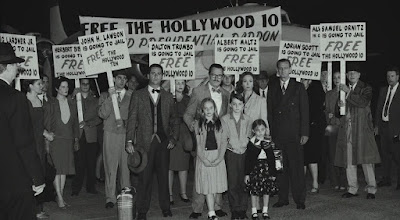In 1947, successful screenwriter Dalton Trumbo (Bryan Cranston) and other Hollywood figures get blacklisted for their political beliefs.
Being a Kiwi, American history is not something that was taught too much during my primary and secondary school education. The World Wars were really more the focal point (and Ancient Egypt for some reason) so the 'Hollywood Ten' is not something that I was previously aware of. As such, the content of this biographical film was incredibly eye-opening. I mention this because those that are already aware of what occurred with the House Un-American Activities Committee (HUAC) could find the film tedious. The film is not the flashiest, in fact, at times it looks like it could have easily been filmed at a Direct-to-DVD quality, and the topic seems to have been covered many times before; Guilty by Suspicion, Hollywood on Trial, One of the Hollywood Ten, and The Front, for example.
The film, as with most films, is split into three parts; the first leads up to their contempt, the second is living with the blacklist, and the final act is their attempts to rebuild. I mention this structuring as a way of explaining that the film focuses more on the 'Hollywood Blacklist' itself and the consequences it had on those affected.
As someone that had no idea about all of this, however, I was gripped from start to finish. Trumbo is based on a true story. The story of men being persecuted because of their political beliefs. Beliefs that were not being persecuted when that political country was an ally in the Second World War, but once the Cold War cometh, anything red is a red flag for democracy. The idea that a government could be so black and white about the matter should not be shocking. In fact, it is something that we still see today, but it is no longer just political affiliations; it is also religions and ethnicities that are targeted. Trumbo brings it to the big screen in a big way; a reminder of the consequences to the innocent human beings that are persecuted, even affecting those associated with them.
The film is not all one-sided. It, of course, has the story that it is trying to tell, but it is not afraid to show both sides of that person. Whether it be excessive drug-use (though the film focuses on pills rather than marijuana), the negligent yet controlling father-figure, or the hypocrisy of reaping the benefits while speaking ill of democracy. Flawed characters are very real, and these multi-dimensional portrayals are a constant reminder despite Bryan Cranston's unnatural accent.
There is a great ensemble cast involved. From the aforementioned Bryan Cranston, Diane Lane, Helen Mirren, and Elle Fanning, to John Goodman, Alan Tudyk, and... Louis C.K.. I was hesitant to mention Louis C.K. because of the scandal that came out with the #MeToo movement, but he is an important part of the film. His character of Arlen Hird (a composite character; a combination of more than one individual) was the anchor for much of the film. Dalton Trumbo represented the cream of the crop, the tall poppy that has a lot of money to get by on, but Hird represents those that didn't; the middle to lower class that suddenly couldn't pay for medical bills, rent, or food. His situation makes him constantly question Trumbo's motivations, interrogating him at every opportunity, because he has more to lose. The banter between Bryan Cranston and Loius C.K. is the cement that holds the central core of the film together. John Goodman is great too, but for different reasons.
Admittedly, some of the other cast can come across as one-dimensional. David James Elliott and Helen Mirren's portrayals of John Wayne and Hedda Hopper were so thinly veiled that their performances may have well have been an audition tape for the villain in an upcoming Disney film. More caricature than real. So, while the protagonists got to flex their good and bad sides, the antagonists didn't get the luxury.
This incredibly intriguing look into the political system of the United States and how it affects so many seemingly independent industries is fascinating. As well, it harks back to the era where screenwriting was worth more than its weight in gold. Where production on a film did not start until the script was finalised, and more importantly until the script was deemed high enough quality. It's something that is missing in today's society where seeing films is so prevalent that the quantity of output is more important than the quality (ironic coming from a man aiming to release a movie review every single day, I know).
It's a great feeling when you find a film that grips you. Trumbo doesn't have any of the fancy cinematography, and the score is nothing to write home about, but that sense of immersion you get from these actors performances is amazing. Definitely one worth checking out.




